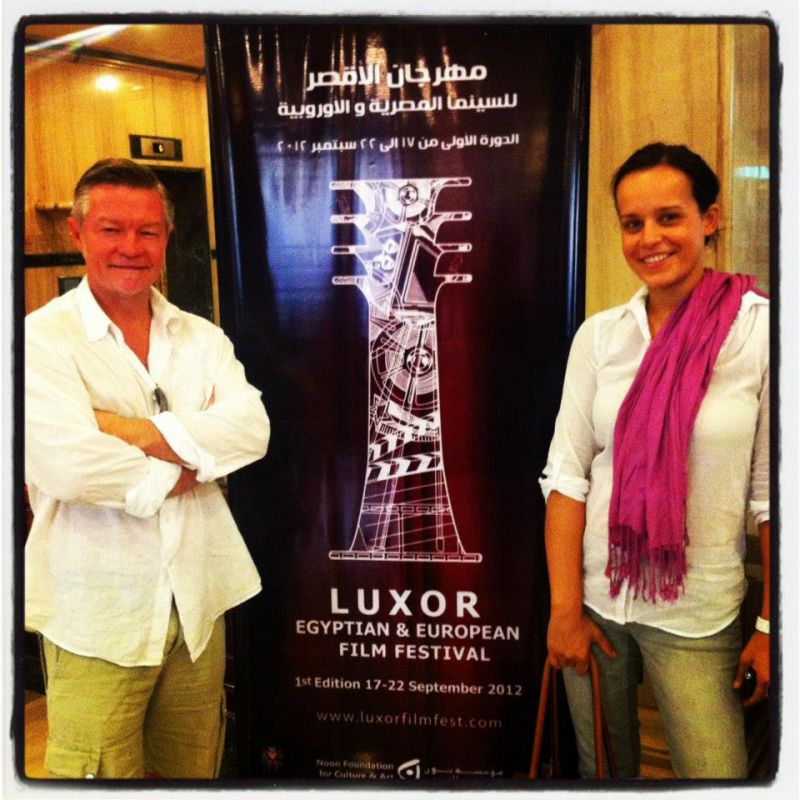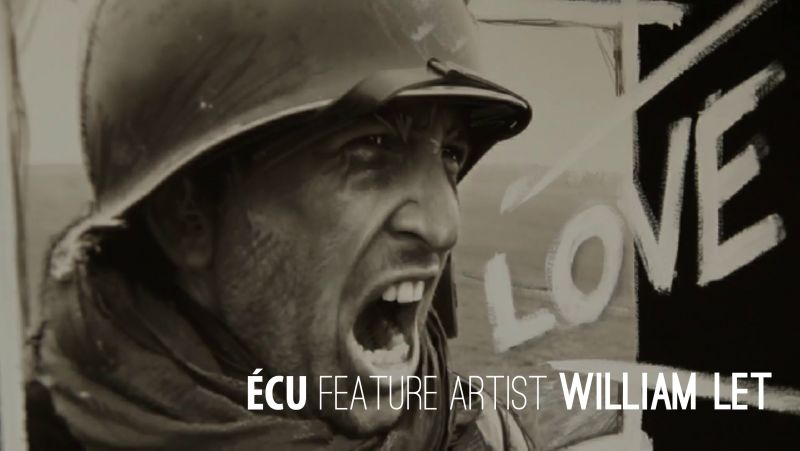The European Independent Film Festival for 2008 has received some terrific entries from all around the globe, including many from areas of political and military conflict. One such film is the stunning Anatema, directed by Agim Sopi, which tells the story of a woman who is raped and subsequently gives birth to a child in war torn Kosovo. Originally intended as a war documentary, Anatema eventually became the fictional recreation of real-life events after Sopi lost all of his early footage following an attack by Serbian military forces. The film received a small amount of funding assistance from the Kosovan Ministry of Culture, but was largely financed by Sopi himself through investments from his family and the sale of many personal possessions.
Australian director Wayne Coles-Janess knows all about the difficulties of filming in a world ‘hot spot’. The Iraq war was looming in March 2003 when he flew to Baghdad to begin filming his documentary In the Shadow of the Palms: Iraq, a film that gives an intimate insight into the lives of ordinary people during Saddam Hussein’s regime before, during and after the war. Facing all the usual hurdles of the independent filmmaker, Coles-Janess mortgaged his Melbourne apartment to help fund the project, acknowledging the difficulty of making films “on overdrafts, credit cards and lines of credit”, and revealing that “all Australian government film industry agencies” rejected his applications for funding assistance. Despite the budgetary constraints, the director remained in Iraq as the ‘shock and awe’ campaign raged, continuing to document life in Baghdad not seen in the media.
Similarly, award-winning filmmaker James Longley ventured into the hostile territory of Iraq in September 2002, ready to start filming his documentary Iraq in Fragments. With patience and persistence, Longley travelled around the country and filmed until early 2005, accruing two years of guerrilla reportage on the ground and capturing stories from the fractured lives of Sunnis, Shias and Kurds, each impacted upon so profoundly by the war and subsequent collapse of the government.
But while financial concerns and painstaking, time consuming projects are standard in independent filmmaking, putting one’s life at risk is something particular to the business of filming in a war zone. Coles-Janess remembers some scary moments from his Iraq experience. “One time I was in the neighbourhood at night before the war and these guys grabbed me and thought that I was a pilot that had been shot down or a spy or whatever,” he said. “There was a bit of toing-and-froing but luckily some people that knew me in that area heard all the commotion and rescued me.” Unable to relax in the constant atmosphere of tension, anger and frustration, the director remembers feeling physically vulnerable and at risk. “You are almost expecting to hear or feel gunshot as you’re walking along. Everyone’s got guns and is emotionally enraged.”
Australian director Kylie Grey knows too of the incredible personal hazards awaiting journalists and filmmakers in war zones. Grey’s My Home – Your War, a hot contender for ÉCU 2008, was also shot in Iraq during and after the conflict. Travelling with her minder, which every foreign journalist was obliged to have, Grey recalls the stress of putting his life at risk and the potential of her own arrest as she constantly pushed him to take her film crew “away from the media circus” and into the potentially treacherous areas to capture “the real Iraq”. Following the collapse of the government, the director tells of a hostile and frightening environment of “bullets, kidnappings, and checkpoints everywhere”, not to mention the danger and bedlam of trying to travel around a city of five million people all “driving fast with no traffic laws and traffic lights not working due to a lack of electricity”. Less life threatening but equally problematic was the issue of Grey and her entire crew contracting diarrhoea from dirty water, a result of the city’s plumbing being destroyed by bombing. “My cameraman was hospitalised with it”, she remembers grimly.
Echoing Grey’s recollections, the production notes from Longley’s Iraq in Fragments highlight the personal danger the director put himself in in order to get his film made. ‘By April 2003… Baghdad had descended into a regime of looting, kidnappings, bombings…’ he writes, adding that since the government had collapsed he could film whatever he wanted as long as he could stay alive. He recalled that an increasing number of journalists and other foreign civilians had been kidnapped or killed, and that he himself had received numerous death threats, both against himself and the people he was filming. For Agim Sopi in Kosovo, death was more than a constant threat - it was a reality. “Most of the people from my film the original documentary upon which Anatema is based did not survive the war”, he tells, adding that people were being totally “annihilated”.
The highly possible prospect of death on the job would be enough to make anyone reconsider their position and perhaps head for safer shores, but that’s exactly what makes these bold, maverick filmmakers stand out from the crowd. They put their own safety on the line for the sake of their films, their passion and desire to tell their stories outweighing the very real element of danger.
As if financial strain, unceasing perseverance and the possibility of death or injury weren’t enough, the war zone filmmaker incredibly has still more problems to face in the process of getting their film made. Political, military and administrative interference can be a real thorn in the side, causing projects to be put on hold or placed in jeopardy. During his time in Iraq Coles-Janess was arrested as many as 11 times by Iraqi militia and soldiers, who spent hours checking his papers and interrogating him. On one occasion he was taken to military headquarters, where he watched as a general and a colonel discussed his fate, gesturing wildly. As the men pointed to the director’s camera and argued, Coles-Janess realised that his film could be in trouble. “It only takes someone to have a bad day,” he said “and my six weeks or so of work is gone.”
Agim Sopi recalls the horrific memory of being surrounded by Serbian militia whilst making the documentary precursor to Anatema. “I knew that we could not escape from the military forces. We had to give up. Also, I was aware that if the solders found us with the camera and the shooting materials they would have executed us immediately.”
Additionally, acquiring permissions to film in a war zone is no easy task, particularly in an environment of governmental instability and steadily approaching war. Often freelance foreign journalists are viewed with mistrust, and according to Longley’s experience, each of them requiring a government minder was further looked down upon as they took resources away from media that mattered to the propaganda strategy of Iraqi officials. The filmmaker encountered heavy resistance from authorities when he initially tried to gain the rights he needed to film, likening the experience to ‘trying to sweet-talk a paranoid rhinoceros’. Longley was further troubled by an expired visa which forced him out of the country, and he waited out the war in Egypt, biding his time until he could return to the embattled country to record whatever was to happen next.
There can be no denying that the odds faced by independent filmmakers in war zones are formidable, but the mountain of challenges prompts the question: why do they do it? What drives these extraordinary people to put their safety, their money, and their sanity on the line for the sake of a film?
In the end, it comes down to passion. A passion for truth, and a passion for telling the stories that might not otherwise be told. In In the Shadow of the Palms: Iraq, Coles-Janess focuses on the lives of ordinary people: an Olympic wrestling coach, a professor of Arabic poetry, an imam and a cobbler. When he returned to Iraq after the war he found that the wrestling coach was missing after having been arrested by American troops. The other characters of the film speak with disbelief at the mess their country has become. These are the stories not seen in the standard media channels. “My drive comes from a desire to tell the stories of people behind the news, to get the other story, and to give balance and a human face to media coverage about the war”, says Grey. Despite the differences in language and culture, the filmmakers can readily empathise with the concerns of their subjects. “They want to have a job. They want to have a future. They want to have a career. The war got in the way”, said Coles-Janess.
In addition to the personal stories, there exists also a desire to document the changes happening in the world as they happen, an urge to capture history as it is made, and the opportunity to express political opinions. “I think the Iraqis see the US as a colonial power and they don’t want to be liberated in that kind of way,” said Coles-Janess. For these directors, their films provide an opportunity for silent voices to be heard, hidden experiences to be seen, and private opinions to be put forward. “I believe that it is worth any kind of sacrifice to realise the dream of telling the story” says Agim Sopi.
So incredible and important are their stories, perhaps it is no wonder these filmmakers would gladly put so much at stake. One can merely marvel at their strength, determination and courage.

























 Hillier Scott
Hillier Scott 


